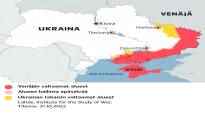ISW does not believe that Russia will deploy a nuclear weapon unless the front collapses completely.
14:00•Updated 14:06
American think tank Institute for the Study of War (ISW) (you move to another service) has prepared a forecast of how the war in Ukraine will continue during the winter and spring. ISW also takes a position on how likely it is that Russia will deploy nuclear weapons.
The war is now in a situation where Russia has occupied large areas of eastern and southern Ukraine. However, Russia has been on the defensive in recent months and the troops it sent to war are very worn out.
For example, in the Kherson region in the south, Russian troops had to retreat in September after an attack by Ukraine. Although the front has been almost stationary for the past few weeks, Russia has been preparing a new retreat by moving tens of thousands of civilians to the east bank of the Dnieper.
President Vladimir Putin with the decree, a partial movement was implemented in the fall, with which, according to Russia’s own announcement, 300,000 men were recruited into the army. In addition, the country aims to form battalions made up of volunteers.
ISW estimates that in this situation, Russia will try to maintain its current positions in Ukraine. Recruited soldiers have been sent to supplement worn out units. However, they haven’t had time to train them, so the military benefit brought by the additions is weak.
ISW considers the training given to new Russian soldiers to be essential for the continuation of the war. Most of the new fighters receive 4 to 6 months of training, so they could be transferred to the front in the spring.
In Russia, new conscripts enter service at the beginning of November. Since Russia has now declared the territories it occupied in Ukraine to be part of Russia, conscripts can also be used in combat missions in these areas. This conscript age group could move to Ukraine from the end of spring, ISW estimates. According to the think tank, the Russian armed forces would be receiving a significant amount of moderately trained manpower in April-May.
Fighting is possible in winter, but not in spring
The terrain of Ukraine is mostly quite flat and it is characterized by wide open fields. When the soil is dry or frozen, it supports armored vehicles well. During autumn rains, the terrain becomes muddy, which makes the use of motorized vehicles difficult, but does not completely prevent it, according to ISW. However, both warring parties are dependent on the road network.
In winter, the ground in Ukraine usually freezes, making movement easier. Many of the countless rivers that cross Ukraine also freeze over.
Spring is the most difficult time for fighting in Ukraine, says ISW. The land is completely muddy and the rivers are muddy after the snow melts.
ISW estimates that Russia’s next major attack in Ukraine will take place in late spring, when new soldiers have arrived at the front and the terrain has dried out.
Putin focuses on freezing Europe
According to ISW, President Putin has not shown any desire for ceasefire negotiations. Instead, he has repeated that Russia’s goal is a complete victory over Ukraine, and questioned Ukraine’s right to exist.
ISW believes that Putin will try to limit his energy exports to EU countries during the winter, so that the winter would be as difficult as possible for EU citizens. This is how Putin puts pressure on the EU leaders so that they would bend to Russia’s demands and stop arms aid to Ukraine.
This does not seem likely now, as the EU has been very united in supporting Ukraine. Governments have prepared citizens for a difficult winter. However, the effectiveness of Putin’s plan will not be seen until spring, states ISW.
Russia led by Putin has paid a very heavy price for the war, when tens of thousands of men have died or been wounded at the front and hundreds of thousands have fled the country. From Putin’s point of view, the sacrifices may still turn out to be worthwhile if the current front holds and with the new troops, Russia will be able to achieve its goals in the spring, ISW thinks.
However, it does not make sense for Putin to expand the war or pursue peace negotiations by deploying tactical nuclear weapons. ISW does not believe that Putin will use nuclear weapons in a war, unless his military power unexpectedly collapses completely.
ISW believes that the war will continue as traditional warfare at least well into next year.
